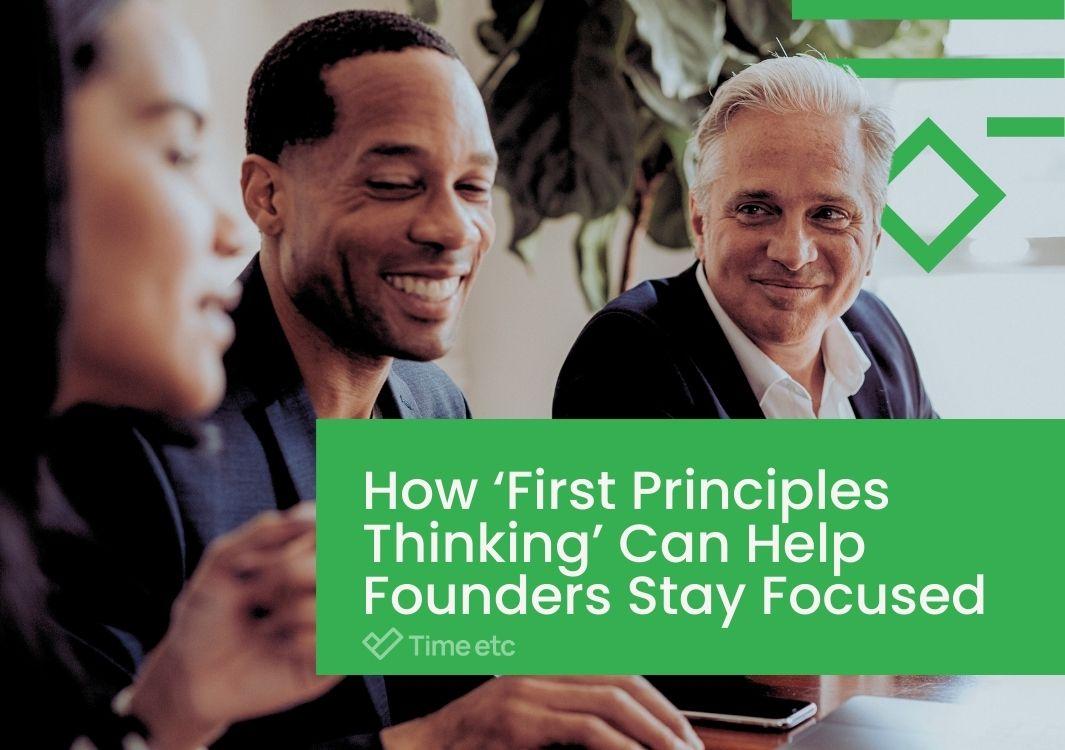There is no question that the world is becoming more complex. The pace of life has never been faster, information is easier to find than ever before, and new technologies are advancing at an unprecedented rate. But, while all of this may have its benefits for the world as a whole, it’s not necessarily helping to make life easier for business owners.
The problem is that many of us think complexity is what makes businesses competitive. After all, complexity is associated with power and sophistication. But in reality, the more complex something is, the harder it is to get it right. The more moving parts you have to deal with, the more attention and resources you need to spend.
In her bestselling book Why Simple Wins, futurethink founder and CEO Lisa Bodell says “All too often, we embrace a mindset of complexity without even realizing it. With the best of intentions, we value addition, not subtraction, more, not less."
She explains, "We think that more—getting more for our products and services, offering more, building more, creating more—is better for ourselves, our colleagues, our customers, and other stakeholders. But often, it’s not. More can become overwhelming, paralyzing, dissatisfying. We add more in an attempt to solve problems; instead we create a monster.”
5 reasons why business owners should embrace simplicity
As a business owner, you face a lot of pressure to compete in the modern marketplace. Not to mention, balance all your responsibilities with managing a multitude of complex tasks to keep the wheels of your company turning.
Simplicity is often overlooked and underestimated, but it is actually a powerful strategy that can bring many benefits to your organization.
1. Customers crave simplicity
In a recent survey of over 7,000 consumers and 200 marketing executives across a range of industries, the results pointed to one key indicator of success: decision simplicity.
When the decision-making process is simpler, consumers are 86% more likely to purchase from your brand. They’re also 115% more likely to recommend your business to others. Additionally, 66% of consumers say they’re willing to pay a "simplicity premium" of as much as 6% more if it is easier to use and understand than a similar product.
Simplify your website navigation, ensure clear and concise communication, and minimize complexity in your product offerings. By making it easier to engage with your products and services and understand the value you provide, you create a positive and memorable customer experience that keeps them coming back for more.

2. Simplicity breeds creativity
With the countless responsibilities that come with running a business, it's easy to become consumed by the minutiae of day-to-day operations. However, it's tough to get the creative juices flowing when you're constantly jumping from pillar to post.
A recent research study found that 72% of us get our most creative ideas in the shower, not the office. According to experts, this is due to the familiarity of the bathing routine, combined with its solo nature, allowing your mind to truly wander with no distractions. Not only that, but the shower is one of the few places where we can’t take our devices and fall victim to multitasking.
So by embracing simplicity and giving yourself opportunities to disconnect from the endless stream of distractions, you create the ideal conditions for fresh, creative ideas to emerge.
Bodell agrees, "Eliminating complexity allows people to escape their routines and try new things.”
See: Why Scheduling Creative Time Is Crucial For Success
3. Simplicity makes room for innovation and success
In a world that often glorifies multitasking and busyness, simplicity might sound like a rather counterintuitive approach to driving innovation and achieving success.
Whether it's an overwhelming workload or too many complex processes to follow, complexity creates stress, confusion, and other potential roadblocks to innovation.
By streamlining processes and focusing on quality instead of quantity, companies are able to make better use of their time and resources and focus on what really matters—creating innovative products and services that meet their customers' needs.
This approach inspired one of the UK’s leading business executives, Julian Richer, to form a “cut the crap committee” within his company—a team dedicated to “getting rid of unnecessary stuff.”
The result?
His company Richer Sounds holds the Guinness World Record for the highest sales per square foot of any retail outlet in the world and also donates the largest percentage of its profits to charitable organizations of any company in the UK.
Don't underestimate the power of simplicity to drive innovation and pave the way for your business's long-term success.
4. Complexity affects decision-making skills
As a business owner, you're probably used to wearing many different hats in order to tackle your long list of responsibilities. And with it, comes a whole lot of decisions—big and small—you have to make on a daily basis.
This is another area where complexity rears its ugly head to hinder your effectiveness.

Too much complexity in your to-do list means you're likely to come face-to-face with decision fatigue—the more decisions a person makes, the harder each decision subsequently becomes.
This is because human beings only have a limited supply of mental energy each day. Our prefrontal cortexes rely on oxygenated glucose as fuel to function effectively, and even minor decisions (like working on a new task) can take big hits out of our fuel reserves. As a result, we're much more likely to feel overwhelmed or mentally drained way before our day is done.
Complexity can also lead to choice paralysis—the more options we have in front of us, the harder it becomes to choose one. Too many options on your to-do list can make it difficult to know where to begin or what to do next, which can waste valuable time and energy that you could be spending on more meaningful work.
Simplicity, on the other hand, clears the path to effective decision-making. Reducing your cognitive load leads to clearer thinking, more informed choices, and better results.
See: How To Make Better Decisions As An Entrepreneur
5. Simplicity restores your work-life balance
One of the most significant challenges for business owners is maintaining a healthy work-life balance. The relentless pursuit of complexity often leads to long working hours, constant stress, and a lack of personal time.
Nevertheless, it's been extremely well-documented that neglecting your work-life balance can come at a serious cost, not just to your personal well-being but also to your productivity and effectiveness as a business owner.
At its core, embracing simplicity forces us to be more strategic about how we spend our time and energy. Prioritizing the most impactful tasks that drive your business forward and avoiding distractions is key to reducing stress and overwhelm, and creates much-needed space for you to rest, recharge, and enjoy yourself outside of work, too.
7 ways to simplify your day
With the never-ending cycle of packed schedules, hectic days, and so much to do in so little time, it's easy to feel like complexity is just part of the job description as a business owner.
Fortunately, there are several easy and effective steps we can take to simplify our routines and even achieve more in less time.
1. Be prepared
One of the best ways to set yourself up for a less complicated day is to lay the foundations the night before. Take a few minutes in the evening to lay out your clothes, pack your bag, and organize any materials or documents you'll need.
This may sound like common sense, but it's not just time we're saving here.
Remember, each decision we make will eat into our supply of oxygenated glucose—our mental fuel. We know there's a big difference between choosing what outfit to wear and choosing the steps you'll take to grow your business, for example. But to our brains, any decision is still a decision.
So by removing as many elements of choice from our mornings as possible, we can keep our mental energy levels high for when we need it most. You’ll be surprised at how much less of a struggle it is to stay focused and motivated throughout the rest of your day.

2. Limit your working hours
When you limit your working hours, you naturally become more intentional with your tasks. Knowing that you only have a finite amount of time to accomplish your work motivates you to prioritize effectively, stay focused, and avoid unnecessary distractions to make sure it all gets done within the timeframe you've set.
And when you're able to get more done in less time, restoring your work-life balance becomes much easier when you're not constantly having to work overtime to cross everything off your list.
See: 3 Ways Your Calendar App Can Make You More Productive Every Day
3. Set firm boundaries
Putting boundaries in place shouldn't just apply to your working hours if you want to reduce complexity in your day.
When you combine all the ways that senior executives can receive communication in today's world—phone calls, emails, instant messages, and so on—the number of incoming messages the average executive has to deal with has grown from 1,000 per year in the 1970s to more than 30,000 per year today.
Let’s be honest, people rarely achieve their goals when they're stuck in a constant stream of notifications, emails, and interruptions, so to simplify your day, establish clear boundaries around when and how you can be reached. Make sure to clearly communicate these boundaries to your team, colleagues, clients, and loved ones at home to help set realistic expectations and make sure everyone's on the same page.
"The more you protect your time, the more valuable it becomes.” — Peter Voogd
4. Clear your workspace
Your physical workspace is another great example that sometimes less is more.
Experts have linked cluttered environments to poorer mental health and well-being, impaired cognitive skills such as visual processing and memory, and even unhealthier eating habits.
So clear out anything you no longer need, including any unnecessary documents and apps on your computer.
Keeping your workspace simple and clutter-free can go a long way in helping to reduce distractions that can hold you back from doing your best work. You'll also save yourself a great deal of time (and frustration!) when everything is well-organized and easy to find.

5. Audit your current to-do list
According to Bodell, “We can eliminate complexity and create space for more meaningful pursuits by starting with the parts of our work we can control and expanding from there.”
She suggests taking a piece of paper and drawing a line down the center, dividing it into two columns.
Consider the specific set of skills and talents you bring to the table as the head of your business, and ask yourself “If I could make full use of these skills to help achieve my company’s goals, what would I spend my day doing that I’m not currently able to?” Make a list of these tasks in the left-hand column.
Next, ask yourself: “What am I currently doing that occupies most of my time each day?” Put these tasks in the right-hand column.
As a final step, circle the items in the right-hand column (the tasks you do every day) that add value to your business.
6. Automate, delegate, or eliminate
Any tasks in the right-hand column of your list that aren’t circled and don’t add value should be taken off your plate as soon as possible. But what happens to them next?
If you have a strong system in place that will work consistently without the need for your involvement, consider if any of these tasks could be automated.
But chances are, it's unlikely that you'll be able to automate everything, as some tasks will require a more human touch. Delegating those tasks to a capable team member or skilled professional will ensure they receive a more personalized level of attention that technology lacks.
And if there's anything on your list that creates little to no value at all, you may find it much more beneficial in the long run to eliminate it completely.
7. Prioritize your two most important tasks each day
Another technique that Bodell recommends for reducing complexity is to practice "Two Today." In other words, identify two things you want to complete that day.
Think about the short- and long-term goals you've set for your business, and the steps needed to achieve them. Take a look at the left-hand column of your list and the tasks you've circled in the right-hand column if you're looking for a good place to start.
Instead of overwhelming yourself with a long list of responsibilities, a more streamlined and impactful agenda sets the foundation for a productive day. Staying on track is no longer a struggle, and you can build a strong momentum that'll take you closer to success.
"When you make a conscious effort each morning to focus on specific goals, your afternoon is less likely to be derailed by distractions or unplanned matters," says Bodell.
See: How To Prioritize As An Entrepreneur: What To Do When All Tasks Feel Important

What's the bottom line?
When it comes to driving growth in your business and taking back control of your day, sometimes less is more.
"For each of us, simplicity amounts to an enormous, untapped opportunity," says Boden. By understanding the potential pitfalls of complexity and taking steps to reduce them, you create an environment that boosts creativity and innovation, as well as your customer experience and bottom line.
If you’re ready to cut out unnecessary complexities from your day so you can reduce stress and restore your work-life balance, Time etc is here for you.
We are dedicated to helping hardworking and ambitious entrepreneurs take back control over their days by providing the best virtual assistants to take time-consuming tasks off their hands.
Speak to our expert team to get started or try a skilled virtual assistant for free today!












